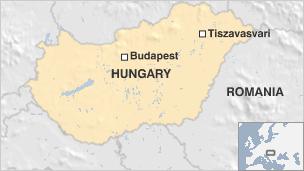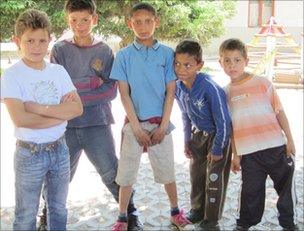Hungary's Roma encounter 'gypsy crime' gendarmes
- Published

Some of the "gendarmes" are paid by the council
Far-right activists have built up support in Hungary and are now taking the law into their own hands - prompting accusations that they are stirring racial hatred.
Tiszavasvari is the "capital" of the radical right-wing Jobbik party - on the faultline of ethnic tensions between the Roma minority and the non-Roma majority.
It has a Jobbik mayor who talks of "gypsy crime" and has set up a uniformed vigilante group in response, putting the party on collision course with both civil-rights groups and the conservative Fidesz government.
Margo Vadasz Sandorne, a caretaker at a community centre on the eastern edge of town, admits there is a crime problem among local Roma but urges against stereotypes.
"I teach my grandchildren never to steal, never to take anything which does not belong to them," she says.
There are clothes laid out on the grass to dry and half-naked children play opposite in the hot, early summer sunshine.
The hard mud track is flanked by identical houses in an advanced state of disrepair. Girls queue with containers at a communal tap - there is no running water in the houses.
Many children wave or shout greetings. Some adults return my nod, others simply scowl.
'Loan sharks'
Mayor Erik Fulop says he and his party use the phrase "gypsy crime" to refer to "types of criminality which are unfortunately especially prevalent among the Roma - extortion by loan sharks, and robberies from homes and gardens".
He has launched extortion proceedings with the tax and customs office against 17 local Roma.
He has also set up a "gendarmerie" based on an erstwhile nationwide force of the same name - Csendorseg - disbanded in 1945.
The word carries unfortunate connotations in Hungarian - in 1944, gendarmes played a central role in rounding up Jews whom the Nazis then deported to concentration camps.
In Tiszavasvari, 10 gendarmes now patrol the streets, separately from the police. Five of them are paid from the council budget. They are unarmed but have the right to detain any suspected wrong-doer until the police arrive.
I accompany them in their patrol car and we first investigate a burglary, close to a Roma area, where regular police caught the suspect - a young Roma man - red-handed.
Next we visit the house of Margit Papp.
The 76-year-old widow, who lives alone in a house with a big vegetable garden she tends herself, complains that almost every crop she plants is stolen by Roma.
Once they even took the metal poles which hold up her vines. Another time they cut her phone line, before smashing the window and climbing into the house.
"I was pleased when I heard that there would be gendarmes," she said.
"Whoever it is, they're responsible for public order."
New legislation
But the government in Budapest have been stung into action by recent incidents between Jobbik-affiliated vigilantes and local Roma in two other settlements, Gyongyospata and Hajduhadhaza.

Zoltan Balog, state secretary for social inclusion, told me that local government could not endorse paramilitary activity aimed at ethnic or religious groups.
The government has just amended the penal code and passed a decree issuing fines for citizens' groups that try to take over the job of the police.
In Tiszavasvari, Erik Fulop accuses the government of suppressing initiatives aimed at "upholding law and order".
County police, however, challenge his portrayal of the town as a hotbed of crime, pointing out that it compares favourably with other towns in the county, where the crime rate is below the national average.
A police spokesman stressed that there was no co-operation agreement with the gendarmerie.
'Flames of racism'

A local school principal says Roma children are keen to learn
Aniko Koka, a local Roma activist, says relations between Roma and non-Roma have deteriorated since Jobbik won control of the town.
"What we desperately need here now is jobs, and for the town leadership not to fan the flames of racism," she says.
In October 2006, a Tiszavasvari teacher, Lajos Szogi, was beaten to death by Roma when he accidentally ran over a child in a nearby village.
In April 2009, Roma man Jeno Koka, who worked in the pharmaceutical factory, was shot dead by anti-Roma vigilantes - possibly in retaliation.
Four men accused of that, and the killing of five other Roma, are now on trial in Budapest.
In a primary school on the eastern edge of town, the principal, Erika Levai Kerekesne, argues that her town does have a future, provided jobs are created.
She challenges the stereotype of Roma children who play truant, insisting: "These children want to learn."
The mayor has plans to encourage unskilled Roma to farm council-owned agricultural land, and is looking to attract foreign investment.
And in the gypsy ghetto, Margo is organising the first neighbourhood litter collection, "so people don't look down on us anymore".
- Published27 April 2011